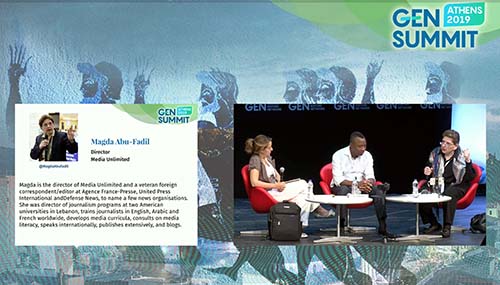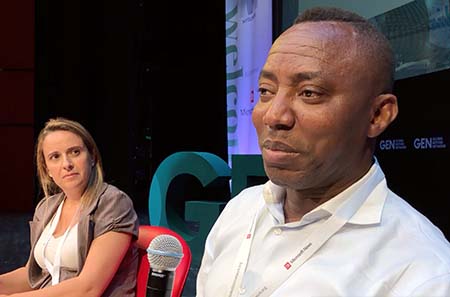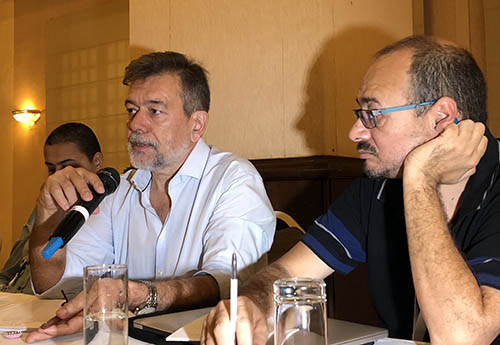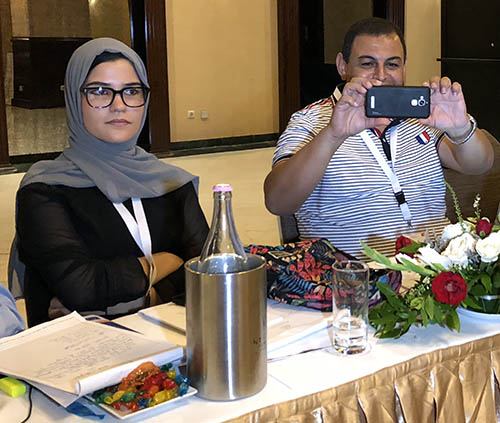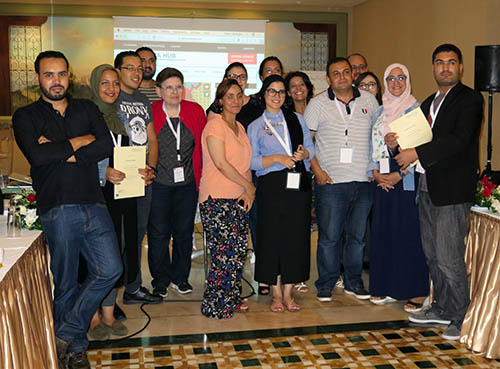Media Unlimited director Magda Abu-Fadil trained Armenian students on how media should cover the issues of migration, refugees and human trafficking during a summer school grouping local and international academics and experts in Aghveran.
The three-day event in July 2019 on migration and development was funded by the European Union and organized by the International Centre for Migration Policy Development, with input from MIBMA Support to Migration and Border Management in Armenia.
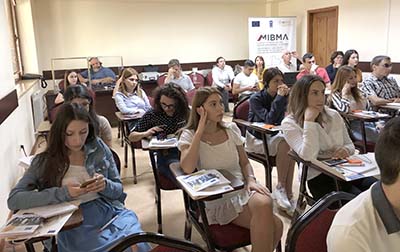
Armenian students attend summer school on migration and development
Abu-Fadil and other specialists briefed 23 graduate and undergraduate students from Yerevan State University, Russian-Armenian University, Brusov University of Foreign Languages and other institutions on a host of topics ranging from security to globalization to migration policies to media matters.
The program acquainted the students with Armenia’s migration policies, which have been in place for over a decade, and the integration of asylum seekers, notably thousands of Syrian refugees of Armenian origin settling in the country.
On the first day Abu-Fadil contributed the media perspective for journalism students, or those who expect to deal with media, with an initial session on the need for journalists to understand the terminology of migration, refugees and human trafficking.

Magda Abu-Fadil tells students they need to understand the terminology of migration, refugees and human trafficking
She demonstrated how they should become acquainted with various international organizations and NGOs that handle these issues and learn about laws, treaties, resolutions and conventions that have been adopted over the years to better frame their reports.
Armenians have emigrated to Russia for decades in search of greener pastures. They’ve also gone further afield to the United States, Canada, Europe and several Arab countries.
Lebanon, for example, boasts a sizeable Armenian community with Lebanese citizens of Armenian descent in all walks of life and actively involved in political affairs.
Perhaps the largest waves of the Armenian diaspora were triggered by the Muslim Ottoman genocide of Christian Armenians in the early 20th Century. It involved deporting and mass killing Armenian subjects of the Ottoman Empire by the “Young Turk” government during World War I. Modern Turkey has never acknowledged it as a genocide.

Armenia – Google Maps
Armenia has also experienced waves of displacement with Armenians moving internally as a result of earthquakes, to which the country is prone, as well as from the enclave of Nagorno-Karabakh in today’s southwestern Azerbaijan, where a majority of ethnic Armenians live and are backed by the government in Yerevan, and where wars have been fought with the Republic of Azerbaijan, thereby forcing the residents to seek refuge elsewhere.
On the second day, Abu-Fadil delved into the details of how media should cover migrants, refugees and victims of human trafficking.

Media’s familiarization with migration and refugee-related organizations
That ranged from researching the story, dealing with data, and statistics from various sources, to interviewing techniques for questioning officials, migrants, refugees and human trafficking survivors, host communities, to examining case studies of good and bad reporting, and the use of social media in getting and telling the story.
On the last day, she turned to media ethics and how journalists should humanize the story by translating numbers and statistics into individuals with fears, hopes, failures, successes and resilience against tremendous odds.
The key, she said, was changing the narrative from hate speech and stereotyping. She provided tips on how to shoot pictures and videos in an ethical fashion given the impact of visual imagery across multiple digital platforms.

MU director on changing the narrative from hate speech and stereotyping
There was also the key element of verification, notably in the age of disinformation and alternative facts where migrants are often vilified based on fabricated accounts.
There was an exercise at the end of each session to test the students’ grasp of the media-related topics and all her presentations had embedded videos to better explain what the ideas and examples meant.

